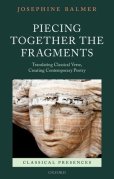The Articulation of Grief III: How Personal Should Personal Poetry Be?
 In this third extract from Piecing Together the Fragments, published last week by OUP, I will be looking at the thorny issue of just how private and personal poetry should be – and how, through translation, this dilemma can be addressed, if not resolved. As in my previous extract, this passage comes from my discussion of my 2004 volume, Chasing Catullus, and examines questions raised by a series of poems written after the death of my niece from cancer.
In this third extract from Piecing Together the Fragments, published last week by OUP, I will be looking at the thorny issue of just how private and personal poetry should be – and how, through translation, this dilemma can be addressed, if not resolved. As in my previous extract, this passage comes from my discussion of my 2004 volume, Chasing Catullus, and examines questions raised by a series of poems written after the death of my niece from cancer.
Throughout these poetic appropriations [in Chasing Catullus], I felt increasingly uneasy, not just at the exposure of such deeply personal experiences but at the unavoidable issue of the validity of turning such private trauma into literature.
Considering these issues, both personal and professional, I came across a passage from the Republic (398a) in which Plato explains that, while poets would be welcomed if they visited his Utopian city, they would not be allowed to live there: ‘If a man, it seems, who was capable by his cunning of assuming every kind of shape and imitating all things, should arrive in our city, looking to exhibit his work, we should worship him as a holy and wondrous being, but would tell him that we have no man of such a kind in our city, nor is it lawful for any such one to be there. And, having anointed him with myrrh and crowned him with garlands, we would send him away to another city’.
This extract provided a foundation text for a new poem, ‘Cancel the Invite’, elaborating on Plato’s original, stretching it, transgressing it, transforming prose in to poetry. In this last transformation, I was influenced by James Harpur’s 1996 poem ‘The Flight of the Sparrow’, which I had long admired, and which preformed similar metamorphoses on Bede’s image of the brevity of life as a sparrow flying through a mead hall on a dark night. I also overlaid my text with echoes of T.S. Eliot’s ‘Little Gidding’ from Four Quartets, which I had been reading at the time of my niece’s funeral, and which formed another layer of intertextuality, another palimpsest. For instance, lines 21 ff of Eliot’s poem are deliberately recalled in its opening lines. In this way, ‘Cancel the Invite’ provided a dialogue with its preceding poems, questioning whether such personal material should be used as poetic subject-matter, and articulating my own conflict about the issue:
If you came, if you came this way to our city,
taking the old road, the salt road, up from the harbour,
and it’s early days, mid-morning, late September,
sky an upturned limpet’s shell, flesh-scooped, chalk blue –
or later, maybe, at dusk in depths of winter,
the sky a pebble dropping to a shore-line pool…
And if you came, if you should slip through our gates
while our guards are down, dealing out their final hands –
Proteus back from exile to walk our boarded streets,
beggar, broken king, virgin trembling on the brink
(for we know you can change face – and heart – at will);
and if you reached, by chance, our marbled market halls
to find some unclaimed spot, set out your same old wares
we’ve all seen, we’ve all heard too many times before
(and besides, could buy cheaper in any local stores)
then we’d welcome you as a stranger, as a guest,
wash your dusty feet, throw fresh garlands round your neck,
commend your art, revere your turncoat trickster’s skill,
and then, because poets are forbidden here by law –
for we need doctors, surgeons, men to find the cure –
we’d show you, so politely, to the waiting door.
Poems such as these not only translate but interact with their source text, re-enacting as well as voicing otherwise unapproachable or uncomfortable emotions such as grief or guilt. Here, translation becomes a part of the transformed poem’s metaphoric landscape or perhaps, as Charles Tomlinson expresses it, quoting Georges Braque’s Cahiers D’Art: ‘“no longer concerned with metaphor but metamorphoses”.’ As Tomlinson continues, such metamorphosis transforms its object ‘into a less predictable, a more variously multi-faceted image’. I also wanted to see how far the line between translation and poetry would stretch, to use translation in new and different ways, to take it as far as it would possibly go as a creative art form in itself, until translation and original poem became indivisible from the other. As I noted in my preface to the volume, my aim in the collection had been: ‘not only to blur the distinction between original and translation, but to make it unimportant, until the reader – or even the writer – cannot distinguish between the two.’
 You can find more details and a sample chapter of Piecing Together the Fragments on the OUP website here. Or order it on Amazon here. There is also a small article about it in the current OUP Classical Studies catalogue which you can find here.
You can find more details and a sample chapter of Piecing Together the Fragments on the OUP website here. Or order it on Amazon here. There is also a small article about it in the current OUP Classical Studies catalogue which you can find here.
For more information on Hazel Dolby’s wonderful calligraphy and artefacts click here
